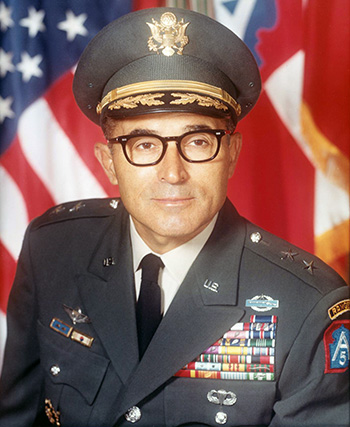
|
Olinto M. Barsanti |
 |
|||
| Rank, Service | ||||
Major General O-8, U.S. Army |
||||
| Veteran of: | ||||
|
||||
| Tribute: | ||||
Olinto Barsanti was born on November 11, 1917, in Tonopah, Nevada. He was commissioned a 2d Lt of Infantry through the Army ROTC program at the University of Nevada in Reno, Nevada, on May 13, 1940, and went on active duty beginning July 1, 1940. After completing the Infantry School, Lt Barsanti served as a Platoon Leader and then as Company Commander of Company H, 38th Infantry Regiment of the 2nd Infantry Division at Fort Sam Houston, Texas, from September 1940 to September 1942, and then as Commanding Officer of the 2nd Battalion, 38th Infantry Regiment at Camp McCoy, Wisconsin, from September to December 1942. During this time he was promoted to Captain and then Major. His next assignment was as Executive Officer of 2nd Battalion, 38th Infantry Regiment at Camp McCoy from January 1943 to January 1944, and then as Commanding Officer of 1st Battalion, 38th Infantry Regiment in Northern Ireland from January to June 1944, and deployed with his unit for the first week after landing in France after D-Day in June 1944. While at Camp McCoy, Maj Barsanti also served as Director of the Ranger Battle Training Course. He served as Commanding Officer of 3rd Battalion, 38th Infantry Regiment throughout the drive from France into Germany, including during the Battle of the Bulge, from June 1944 to June 1945, and during this time he was promoted to Lt Col in August 1944. After serving at Camp Gruber, Oklahoma, from June to November 1945, Lt Col Barsanti again served as Commander of 3rd Battalion of the 38th Infantry Regiment at Camp Swift, Texas, from November 1945 to February 1946. He attended Command and General Staff College at Fort Leavenworth, Kansas, from February to May 1946, and then served as Executive Officer of the 38th Infantry Regiment at Camp Carson, Colorado, from June to July 1946. His next assignment was as an instructor at Command and General Staff College back at Fort Leavenworth from July 1946 to September 1949, and then as a Staff Officer with General Headquarters, Far East Command, in Tokyo, Japan from September 1949 to September 1950. He served on a special assignment to South Korea after the outbreak of the Korean War from June to September 1950, and then served as Assistant Personnel Officer with Headquarters X Corps in South Korea from September 1950 to March 1951. His next assignment was as Executive Officer and then Commanding Officer of the 9th Infantry Regiment in South Korea from March to August 1951, followed by service as Operations and Training Officer with General Headquarters, Far East Command, back in Tokyo from August 1951 to January 1952. He served as Assistant Chief of Staff with Headquarters VI Corps at Camp Atterbury, Indiana, from January 1952 to March 1953, and then as Special Assistant to the Deputy Post Commander at Camp Atterbury from April to August 1953. Lt Col Barsanti next attended Armed Forces Staff College at Norfolk, Virginia, from August 1953 to February 1954, and he then served as Chief of the Survey Section Management Branch at Headquarters U.S. Army Europe in West Germany from February 1954 to June 1955. Col Barsanti next served as Chief of Staff of the Berlin Command from June 1955 to January 1957, followed by service as a Board Member on the Regular Army Augmentation Detachment at the Pentagon from February to August 1957. He attended National War College from August 1957 to June 1958, and he then served as a Personnel Staff Officer, Chief of the Requirements Branch, Chief of the Requirements Division, and Chief of the Manpower Division with the Office of the Deputy Chief of Staff for Personnel for the U.S. Army, and then with the U.S. Army Element in the Office of the Joint Chiefs of Staff in the Pentagon from July 1958 to June 1963. Col Barsanti served as Assistant Division Commander for Combat Operations with the 7th Infantry Division in South Korea from July 1963 to July 1964, and during this time he was promoted to Brigadier General on September 1, 1963. Brig Gen Barsanti next served as Comptroller with Headquarters U.S. Army Europe in West Germany from September 1964 to May 1966, followed by service as Deputy Chief of Staff for V Corps in West Germany from May to September 1966. He served as Comptroller and Director of Programs with Headquarters U.S. Army Material Command in the Pentagon from October 1966 to June 1967, and during this time he was promoted to Maj General in May 1967. Maj Gen Barsanti served as Commanding General of the 101st Airborne Division at Fort Campbell, Kentucky, from July to December 1967, and then deployed with his Division to South Vietnam from December 1967 to July 1968. His next assignment was as Chief of Staff with Headquarters Fifth U.S. Army at Fort Sheridan, Illinois, from August 1968 to June 1971, followed by service as Special Assistant to the Chief of Staff of the U.S. Army in the Pentagon from June 1971 until his retirement from the Army on September 1, 1971. Olinto Barsanti died on May 2, 1973, and was buried at Arlington National Cemetery. His widow, Aletha Imogene Howell Barsanti (1920-2014) is buried with him. |
||||
|
||||

